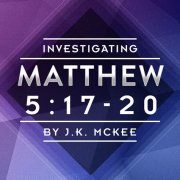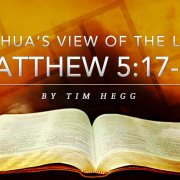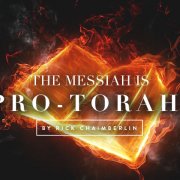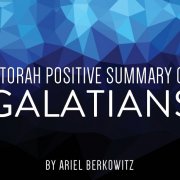What does Jesus (Yeshua) have to say about the Law?
Think not that I have come to destroy (abolish) the Torah (“Law”), or the Nevi’im (“Prophets”): I have not come to destroy, but to fulfil. For truly I say to you, until heaven and earth pass away, not one jot or one tittle shall in any way pass from the Law, until all be fulfilled. Whosoever therefore shall break one of these least commandments, and shall teach men so, he shall be called the least in the kingdom of heaven: but whosoever shall do and teach them, the same shall be called great in the kingdom of heaven. For I say to you, that unless your righteousness shall exceed the righteousness of the scribes and Pharisees, you shall in no case enter into the kingdom of heaven. (Matthew 5:17-20)
The above statements of Yeshua are very troubling for many Christians, primarily because they contradict their theology. Many Christians divide the Scriptures into Dispensations. There was the Dispensation of Law in the “Old Testament,” and now we have the Dispensation of Grace in the “New Testament.” These words of Yeshua are in direct opposition to this theology. Therefore, many resort to twisting His words His words in verse 17 to mean just the opposite of what He said. I have heard it said, “Jesus kept the Law so I don’t have to.” Since Jesus fulfilled the Law, we can safely ignore it. However, after doing some verbal gymnastics with verse 17, there remain further problems with verse 18.
Personally, I would prefer to accept Yeshua’s words for what He says. Malachi 3:6 tells us, “For I, YHWH, do not change. Therefore you, O sons of Jacob, are not consumed.” The Greeks had fickle gods, very moody, and changing with the weather. Unfortunately, the Greek mindset seeped heavily into Christianity. The God of the “Old Testament” was harsh and legalistic. In the New Testament, God transformed Himself into a soft, mushy God of love and grace. Actually, YHWH never changed. He was a God of both Law and Grace in the Foundational Scriptures (O.T.), and He remains a God of both Law and Grace in the Newer Testament. See Deuteronomy 13:1-5:
If there arises among you a prophet, or a dreamer of dreams, and he gives you a sign or a wonder, and the sign or the wonder comes to pass, whereof he spoke to you, saying, “Let us go after other gods, which you have not known, and let us serve them,” you shall not hearken to the words of that prophet, or that dreamer of dreams: for YHWH your God is testing you, to know whether you love YHWH your God with all your heart and with all your soul. You shall walk after YHWH your God, and fear Him, and keep His commandments, and obey His voice, and you shall serve Him, and cleave to Him. And that prophet, or that dreamer of dreams, shall be put to death, because he has spoken to turn you away from YHWH your God, who brought you out of the land of Egypt, and redeemed you out of the house of bondage, to thrust you out of the way which YHWH your God commanded you to walk in. So you shall put the evil away from the midst of you.
In other words, if Yeshua had actually come to turn the people away from the mitzvot (commandments) of YHWH, then Yeshua would have been a false prophet, and the people of Israel would have been obligated to put Him to death. Eventually there were false accusations against Him that led to Him being crucified. However, none accused Him of abolishing the Torah at the time of His arrest.
Yeshua spoke to Jewish audiences. In Scripture, He is called “Rabbi,” [1] even by some of His enemies. They recognized Him as a Jewish Teacher of Torah. If they had perceived Yeshua as being “anti-Torah,” He would never have been called “Rabbi” or “Rabboni.”
When Yeshua referred to the “Law” in verse 17, He was referring to the Torah. Generally speaking, Torah refers to the first 5 books of the Bible, from Genesis to Deuteronomy. However, in Judaism, the term Torah is sometimes expanded to mean the entire Tanakh (O.T.), as well as Talmud and various Rabbinic writings. I believe that Yeshua used the term Torah to apply to only the first 5 books of the Bible, because He also mentioned the Prophets (Nevi’im). As might be expected, the Nevi’im include the so-called “major prophets” (Isaiah, Jeremiah, and Ezekiel), as well as so-called minor prophets such as Joel, Amos, etc. Jewish Bibles also include the books of Judges, 1st and 2nd Samuel, and 1st and 2nd Kings in the section called Nevi’im (Prophets). When Yeshua referred to the Law and the Prophets, He was referring to these two divisions of the Jewish Scriptures, exactly as was understood by the Jewish community. The Third Division of books in Jewish Bibles is called Ketuvim (The Writings), including books like Psalms and Job. Curiously, Daniel is considered part of the Ketuvim. I suspect that Daniel got bumped out of the Nevi’im because his prophecies about the times for the coming of the Messiah (Daniel 9:24-27) were a bit uncomfortable for the Rabbis, so Daniel got demoted to the Ketuvim.
It baffles me. Yeshua said that He came “not to destroy (abolish) the Law or the Prophets. I have not come to destroy, but to fulfill.” Then some Christians come along and believe that when Yeshua “fulfilled” the Torah, it was suddenly abolished! My NAS Study Bible would also take issue with such Christians. In their commentary they write, “Jesus fulfilled the Law in the sense that He gave it its full meaning. He emphasized its deep, underlying principles and total commitment to it rather than mere external acknowledgement and obedience.” Excellent! They got it exactly right! And just as in Yeshua’s day, there are some Jews who are fastidious in their external observance of the commandments (along with very legalistic Rabbinic interpretations of these commands), but who ignore the deeper meanings of God’s Laws.
We also need further definition of the word “Torah.” When the Greeks came along, they translated the word Torah as Nomos, which is the Greek word for Law, which is how it is translated in most English Bibles. However, more accurately, Torah means Instruction or Teaching. Torah includes the mitzvot (laws), but Torah does not mean Law. Perhaps if this term were correctly translated, people might have a better appreciation for Torah. The Torah is foundational for everything that occurs afterwards in the Scriptures. No one can properly understand the Newer Testament without being grounded in the Torah and Nevi’im.
Regarding Matthew 5:18-20, my NAS Study Bible says, “Jesus is not speaking against observing all the requirements of the Law, but against the hypocritical, Pharisaical legalism. Such legalism was not the keeping of all the details of the Law but the hollow sham of keeping laws externally, to gain merit before God, while breaking them inwardly. It was following the letter of the Law while ignoring its spirit. Jesus repudiates the Pharisees’ interpretation of the Law and their view of righteousness by works.” Many times, I find Christian commentaries to be defective. However, in this case, I am very pleasantly surprised. They got it exactly right!
David Bivin and Roy Blizzard [2] have an interesting interpretation of Matthew 5:17-18. “The meaning of Jesus’ words is clear. As long as the world lasts, he goes on to say in verse 18, the Law will last. Here Jesus is in complete agreement with the (Rabbinic) sages: ‘Everything has an end – heaven and earth have an end – except one thing which has no end. And what is that? The Law’ (Genesis Rabbah 10:1); ‘No letter will ever be abolished from the Law’ (Exodus Rabbah 6:1).” Bivin and Blizzard add:
“Destroy and fulfill are technical terms used in rabbinic argumentation. When a sage felt that a colleague had misinterpreted a passage of Scripture, he would say, ‘You are destroying the Law!’ Needless to say, in most cases his colleague strongly disagreed. What was ‘destroying the Law’ for one sage was ‘fulfilling the Law’ (correctly interpreting Scripture) for another.
“What we see in Matthew 5:17ff. is a rabbinic discussion. Someone has accused Jesus of ‘destroying’ the Law. Of course, neither Jesus nor his accuser would ever think of literally destroying the Law. Furthermore, it would never enter the accuser’s mind to charge Jesus with intent to abolish part or all of the Mosaic Law. What is being called into question is Jesus’ system of interpretation, the way he interprets Scripture.
“When accused, Jesus strongly denies that his method that his method of interpreting Scripture ‘destroys’ or weakens its meaning. He claims, on the contrary, to be more orthodox than his accuser…”
“Never imagine for a moment,” Jesus says, “that I intend to abrogate the Law by misinterpreting it. My intent is not to weaken or negate the Law, but by properly interpreting God’s written Word, I aim to establish it, that is, to make it even more lasting.”
“For truly I say to you, until heaven and earth pass away, not one jot or one tittle shall in any way pass from the Law, until all be fulfilled.”[3] The “jot” is the yod (y), which is the smallest letter in the Hebrew alphabet. The “tittle” could refer to the decorative strokes that Hebrew scribes often attach to various letters on the Torah scroll, firmly entrenched by tradition. The “tittle” could also mean the tiny strokes that distinguish one letter from another. For instance, the d and the r, or the j and the t, or the k and the b all look very similar, and could be easily confused, sometimes dramatically changing the meaning of some words. The tiny little strokes differentiating the various letters are often extremely important, as Yeshua emphasized. Neither jot nor tittle would ever be passed from the Torah until all is accomplished.”
According to the Rabbis, when the Messiah comes, he will not only correctly interpret all the problematic verses of Scripture; he will also correctly interpret all the individual words of each verse. When Messiah comes, he will not only correctly interpret all the words; he will also correctly interpret all the individual letters of each word. In fact, when Messiah comes, he will also even interpret all the white spaces between the letters and words! This may sound a bit extreme. However, Yeshua certainly seems to reinforce the importance of each of the words of Torah.
The first part of this verse begins, “For truly I say to you.” My Hebrew NT on this verse begins, “Kee amen omar anee lachem.” The term “amen” is often used at the end of a prayer. However, in this verse, “amen” is the term meaning “truly.” It has the same shoresh (root word) as the noun for “truth,” which is “emunah.” Yeshua goes to great lengths to demonstrate that Torah is eternal, even more so than the existence of heaven and earth. Yeshua taught and preached in both Aramaic and Hebrew, not in Greek. By using the term amen, he was emphasizing the truth of what he was saying.
“Whosoever therefore shall break one of these least commandments, and shall teach men so, he shall be called the least in the kingdom of heaven: but whosoever shall do and teach them, the same shall be called great in the kingdom of heaven.” [4]
Once a Christian asked me if he could eat pork and still get into Heaven. Knowing the disease potential of eating pork, I told him that yes, he could probably get to heaven even quicker! I do believe that some mitzvot are more important than others. I believe that the “Ten Commandments” written on tablets of stone by God’s own finger[5] may be more important than the dietary commandments which are not written on tablets of stone by God’s own finger. Those who break the least of the commandments, and so teach others shall be called least in the kingdom of heaven. Hey, you still squeak in, but at least you made it! That’s the good news!
But what about those who break the more important commandments that are part of the “Big Ten,” the commandments written on those tablets of stone by God’s own finger? Yes, I know that most Christians believe in the Ten Commandments. Many have them on a wall in their homes. They don’t murder people, and most are fairly honest. They aren’t committing adultery, or most of the other items on list of Ten Commandments, at least not on a regular basis. But what about the Fourth Commandment: Exodus 20:8-11 and Deuteronomy 5:12-15? Of all the “Ten Commandments,” this is the one that God spends the most time with, with the most words and verses. I believe that YHWH considers this to be a pretty important commandment. Yes, I know that many Christians observe Sunday. However, Sunday is not the Sabbath. Sunday is the day that was originally set aside to honor the Sun god. Do we have the right to decide on our own which day to honor as the Sabbath? Shabbat (the Sabbath) was blessed and sanctified on the seventh day of the week of Creation, long before there were any Jews. Shabbat begins on Friday at sunset, and ends 24 hours later on Saturday at sunset. Matthew 7:21-23 indicates that many Christians are on a very slippery slope by deciding to ignore God’s instructions (Torah).
“For I say to you, that unless your righteousness shall exceed the righteousness of the scribes and Pharisees, you shall in no case enter into the kingdom of heaven.” (Matt. 5:20)
The scribes and Pharisees had very high standards for righteousness. Do you believe you could reach such standards? I don’t believe you do, and I don’t believe I do. Ultimately, we need the shed blood of Messiah Yeshua, spilled on the cross at Golgotha. Yeshua paid the penalty for all of our sins. However, let us not turn this into “greasy grace,” as an excuse to sin. The NT definition of sin is the same as the OT definition of sin. It is found in 1 John 3:4: “Whosoever commits sin transgresses also the Law (Torah); for sin is the transgression of the Law (Torah).”





Recent Comments: